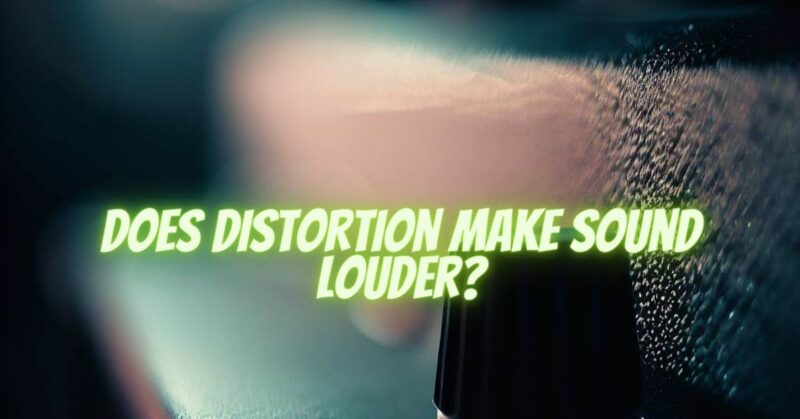Distortion is a fascinating phenomenon in music that alters the sonic characteristics of an audio signal. Among the questions often asked about distortion is whether it makes the sound louder. In this article, we will delve into the relationship between distortion and volume, shedding light on the perception and impact of distortion on sound levels.
- Distortion and Signal Clipping:
Distortion occurs when an audio signal exceeds the linear range of an amplifier or audio device, resulting in signal clipping. Clipping can introduce harmonically rich overtones and alter the waveform, giving the sound a gritty and edgy quality. While distortion can affect the perceived loudness of a sound, it is essential to understand the distinction between actual volume and perceived loudness.
- Perceived Loudness and Distortion:
Perceived loudness is influenced by several factors, including the amplitude of the audio signal, the spectral content, and the temporal characteristics. Distortion, with its added harmonics and altered waveform, can create the illusion of increased loudness due to changes in the spectral content. The additional harmonic content can make the sound appear fuller and more present, giving the impression of increased volume.
- Amplifier Gain and Volume:
It is worth noting that distortion alone does not directly increase the volume of the sound. However, the gain or level of the amplifier can contribute to both distortion and perceived loudness. As the gain is increased, the amplifier reaches its maximum output capacity, leading to signal clipping and the introduction of distortion. This increase in distortion can be perceived as an increase in loudness, but it is important to distinguish between the actual volume and the perception thereof.
- Controlling Distortion and Volume:
Musicians often use distortion intentionally to add character and texture to their sound. While distortion can make the sound appear louder, it is essential to maintain control over the actual volume to avoid unintended consequences. Adjusting the gain or volume controls on your amplifier or audio device allows you to regulate both the level of distortion and the actual volume output.
- Perception and Personal Preference:
It is crucial to recognize that the perception of loudness and the preference for distortion can vary from person to person. Some individuals may enjoy the added presence and perceived loudness that distortion brings, while others may prefer a cleaner and more transparent sound. Personal taste and the musical context play significant roles in determining the appropriate use of distortion and the desired perceived loudness.
Conclusion:
Distortion, while it can alter the perception of loudness, does not directly increase the actual volume of a sound. The introduction of harmonically rich overtones and waveform alterations through distortion can create the illusion of increased loudness due to changes in the spectral content. It is important for musicians to maintain control over both the actual volume and the level of distortion to achieve the desired sound. Remember that personal preference and musical context play crucial roles in determining the appropriate use of distortion and its impact on perceived loudness.


